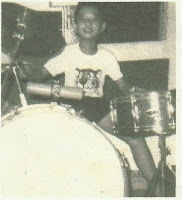I was asked this recently: What is the difference between "used to" and "would"? Let's take a closer look at this.
When we talk about repeated actions or events in the past, especially when they no longer happen, we can use "used to":
I used to bang the pillows with a pair of drumsticks.
Most grammar books actually say you can use "would" instead of "used to" in this context, but take this example:
I would bang the pillows with a pair of drumsticks.
I wouldn't say it. Why? It doesn't sound natural. But, I would say this:
When I was a child, I would bang the pillows with a pair of drumsticks.
In this example, both "used to" and "would" sound perfectly natural. The difference now is that there is a time reference attached to the action.
More examples:
I used to write poems. Not: I would write poems.
I used to/would write poems when I felt lonely.
Sheila used to go for long walks.
When Sheila was living in Sydney, she used to/would go for long walks when the weather was good.
It is worth mentioning here that we often use would to talk about annoying habits:
I would bang on tables with my bare hands everywhere I went and that would drive everyone up the wall!
Note, however, that in questions, we won't use "would":
Did you use to play the drums when you were a teenager? (Answer: yes, I did -> I was in a band)
Not: Would you play the drums when you were a child?
The same rule applies to negatives:
Rob didn't use to sing much when he was younger (suggesting that it wasn't a habit he used to have).
Rob wouldn't sing when he was younger. (This implies that he refused to sing.)
When we talk about past states, we don't use "would":
I used to live in London, and I used to own a convertible.
We used to be computer programmers.
This building here used to be a fantastic cinema.
Complicated? My advice is to stick to "used to", and you won't go far wrong. Just remember that "would" means the same sometimes.




